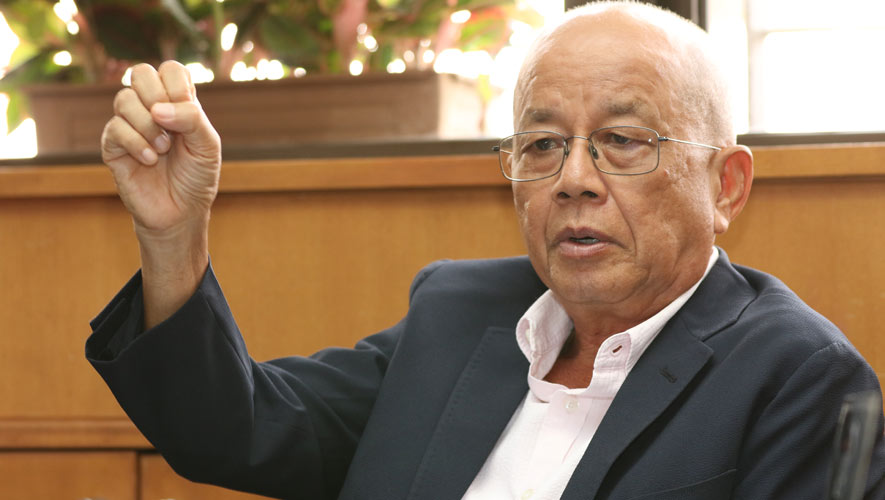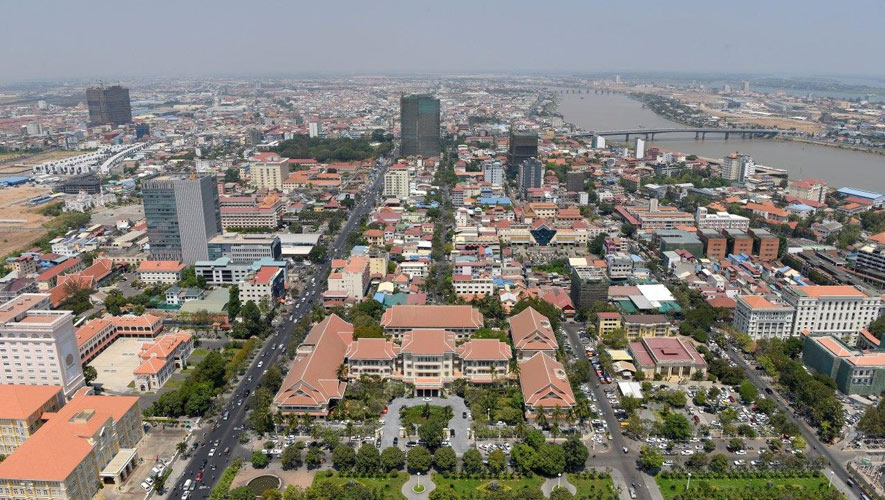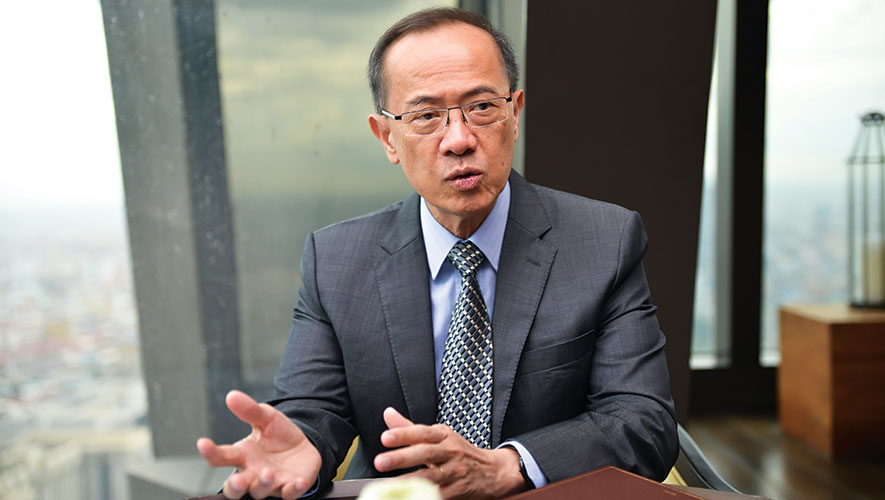Human beings have been always on the move to perform various economic activities in order to make a living but the COVID-19 pandemic has the power to stop or slow down our activities.
For the latest Cambodian Business news, visit Khmer Times Business
Even big aircrafts carriers with missiles and heavy armaments that can destroy big cities have to stop because they cannot fight internal and small enemies such as the virus, said Mey Kalyan, senior adviser of the Supreme National Economic Council.
“One of the main effects of COVID-19 is it makes people think harder what is happening around us and in the world. The experience of standing still makes people think clearer. When we move on busy days, we cannot have a clearer mind,” Kalyan adds.
In the world, it is reported that the sky and air in many cities are cleaner because there is less pollution that is normally caused by human economic activities. However, around the world, there are also many lives that have been lost and many people have suffered from the infection, doctors and other medical services have been working around the clock, and all kind of economic activities have been stopped or reduced to almost a standstill situation.
It has been reported the people who have been affected by the Novel Coronavirus has reached more than 4.2million across the world and killed 290,000. In Cambodia, 122 people have been affected so far, but 121 have recovered so far.
The Asian Development Bank (ADB) said the on-going outbreak of the virus known as COVID-19 will have a significant impact on Asia’s developing economies. The ADB has released forecast figures showing Cambodia’s real economic growth will reach 2.3 percent in 2020, while the IMF predicts Cambodia’s 2020 gross domestic product will contract by minus-1.7 percent.

In its latest analysis, the ADB said there will be sharp declines in domestic demand, tourism and business travel and trade, plus serious disruption to production links and supply chains.
In a worst-case scenario for Cambodia, the ABD estimates that the Kingdom’s decline in tourism revenues could be $856.5 million, which translates to about 3.5 percent of the county’s gross domestic product.
All these have resulted in lost or reduced income of the people. Those who have enough savings and income are in much better position than those who just earn money for their day to day needs.
Thus blocking down that reduces their ability to earn money or, in other in other words, no foods for their stomach, is a critical situation. In fact fighting covid-19 is like fighting wars in two fronts: fighting for real lives and fighting economic lives.
Regarding the impact of the COVID-19 pandemic, Cambodia will be affected mostly by slowing growth in China and globally, affecting its trade and investment, says Jayant Menon, visiting senior fellow of ISEAS in Singapore.
“It’s the tourism that will also be affected as regional and international travel slows. Cambodia should use this opportunity to diversify its export markets and investment sources, as well as domestic production to reduce its vulnerability to shocks,” Menon sais.
“For 2020, growth in ASEAN is likely to be flat (0 to 1 percent) or slightly negative (minus1 percent), in line with projections of the IMF and ADB,” Menon added.
It is understood that the government shall release soon $300million but how will the money be channeled is not known yet. By now all banks will put heavy brakes on all sort of loans while SMEs close down or go bankrupt as they run short of cash-flow to stay afloat, said that Van David, senior associate of public-private partnership PLATFORM IMPACT.
He added that paying jobless garment workers or hospitality workers is one step but the crucial part is should our SMEs collapse because of no cash-flow to tie them through these hard times until global economic recovery returns (expected only by end 2021 to early 2022), there simply won’t be any jobs to be had because many employers may have closed their businesses permanently. Hence, despite all the politically correct statements, we would be keen to find out the exact policy measures to be implemented, he added.
David also said that US Group J Crew has declared bankruptcy. As retail demand drops in the US and EU, brands get hammered with a domino effect on the garments industry which translates into a rather bleak scenario for Cambodia garments sector.
“Our twin-engine economy (garments and tourism) has no real substitutes (China cannot be a substitute market for the EU-US) while agriculture is far too small. Re-boosting an economy requires upsurge of local consumption which depends on job security which is linked to what was said above. Remains on overseas remittances back home will also be badly hit,” he added.
GMAC stated that up to 100,000 factory workers are now affectcted as factories gradually shut down because of no orders and an inability to afford to pay the workforce and a likely similar number would also be affected by the end of May. Remember that every garment worker enables five to six other people from the informal sector to make a living. Add this to the 90,000 returnee workers from Thailand that could not go back to their Thai employers who are also suffering, this brings a very bleak picture of where we stand today.
Kalyan, however, says COVID-19 has revealed both the strengths and weaknesses of the country.
“For strength, we can include, strong leadership and a functional government. Our people who are united and corporate as well with the government, our government institutions, in particular the Ministry of health, which can manage well the critical situation very well, despite many constraints and a food-producing country with some surpluses.
As for the weaknesses, as a developing country which has been developed just over 20-plus years, we still have many of them. There is still room to continue to improve the capacity of our government institutions namely in the areas of public health, science and technology, governance, and agri-processing and agriculture,” Kalyan added.
He says the words of a “techo-orientated” Prime Minister are clear and move the heart and soul of many Khmers. He said we have to depend on our own medical doctors and hospitals at a time of great crisis such as COVID-19, when the movement of people to neighbouring countries are restricted because of od the lockdown.
Normally, rich Khmer people go to have medical checkups or treatment mainly in Vietnam, Thailand, and Singapore, according to Kalyan.
“Now, it is clear that we have to strengthenour government institutions namely in the areas of public health, science and technology, governance, and agri-processing and agriculture,” Kalyan added. He says the words of a “techo-orientated” Prime Minister are clear and move the heart wwand soul of many Khmers.
He said we have to depend on our own medical doctors and hospitals at a time of great crisis such as COVID-19, when the movement of people to neighbouring countries are restricted because of od the lockdown. Normally, rich Khmer people go to have wmedical checkups or treatment mainly inww Vietnam, Thailand, and Singapore, according to Kalyan.
“Now, it is clear that we have to strengthen our medical institutions, both private and public, with a long term perspective. The institution-building wasw such wwill take a long time, and money, and requirs strong wcommitment from leadership,” said Kalyan. He pointed out that COVID-19 has made the task of improving medical institutions a top priority.
The reform of the whole medical institutions, upgrading our equipment and facilities and lifting up the capacity of medical abilities are urgently required, he said.
In the context of the Covid-19 pandemic, the Cambodian government and private sector have been facing the joint challenges of continuing to sustainably promote Cambodia’s socio-economic development, or it can be said that the Royal Government and private sector are “in the same boat”.
In this regard, the contributions to sharing the hardship, resolutions to current challenges and restoration of the nation’s development in this hard time are “vital factors”, according to Deputy Prime Minister, Minister of Economy and Finance and the Chairman of the Economic and Financial Policy Committee Aun Pornmonirath, who emphasised in a consultative meeting with the private sector the need to review and discuss the “Current Business Situation and Necessary Measures” in the context of COVID-19, which continued to spread regionally and globally from April 30.
As of now, the Ministry of Economic and Finance made an announcement on April 30 whereby they are set to make three key interventions such as helping the companies, factories, enterprises, and businesses affected to sustain their business operations, helping to stabilise the livelihoods of the workers who have lost their jobs or been suspended and supporting economic growth, in particular assisting SMEs that are the backbone of the national economy.
Kalyan, on top of this, stressed that going along with the improvements of medical institutions and improving science and technology are equally crucial.
“Because the advance of science and technology is moving very fast around the world, and if we have to be dependent on ourselves, we have to strengthen our science and technology.

Again this work will take a long time and needs strong commitment from the leadership,” he added. In addition to this, the science and technology will develop hand in hand with the improvement of medical institutions.
Regarding the agriprocessing and agriculture, frankly, Cambodia is fortunate and blessed to have land and conditions that are very favourable for farming. During difficult times such as the COVID-19 pandemic, having adequate food is strength.
“At least people feel comfortable to have something to eat in the country and people will continue to eat with COVID-19 or without COVID-19. We all need food. So we need to continue improving our agri- processing capacity as well as agriculture in general, in order to secure our food security as well as security in the region.
Similarly, reviewing the whole agriculture system again and seeing how what can be improved, is another important priority. This task will go along will with the demand for work at home of our Khmer returnees who came back from Thailand recently,” Kalyan added.
Similar to Kalyan, David said that the post-COVID-19 situation has accelerated the use of technology from working from home to online education, use of artificial intelligence and robotics in business and healthcare services. “The Ministry of Posts and Telecommunication of Cambodia is looking at ways to strengthen digitalisation including digital payment and block-chain technology working with other relevant government institutions (the NBC being the primary initiator) and private sector startups. Healthcare globally will also see its fortunes rise in post COVID-19 days” he added.
Agriculture should be boosted with more specific prgrammes, especially in import substitutes. Cambodia imports daily tonnes of vegetables from Vietnam for local daily consumption while it has plenty of fertile land to grow them itself.
Appropriate policy measures haven’t been in place all these decades to support such moves and enhance agriprocessing facilities for value-added purposes because is been far too complacent on the Everthing but Arms-subsidised tax relief export deals with the European Union, particularly garments, footwear and rice, according to David.




